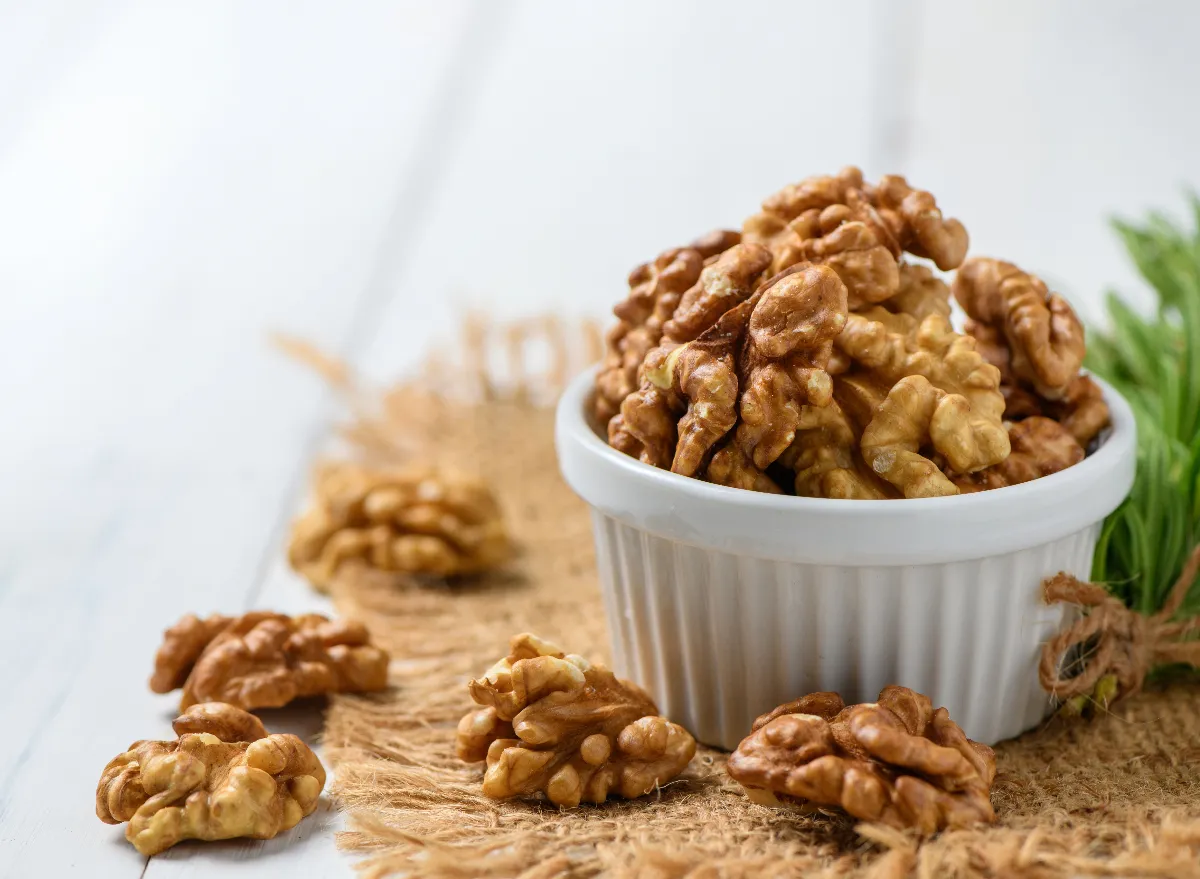The #1 Best Nut To Keep Your Brain Sharp, Says Dietitian

Taking steps to keep our brains sharp is something we can all agree is important. Sure, it is natural to lose some of our brain function as we get older, but certain dietary and lifestyle choices may help slow that process from occurring—ultimately helping you maintain your mental clarity and continue to function independently.
While certain factors that play into brain health are completely out of a person’s control—like a person’s genetics and age—other dietary and lifestyle choices are modifiable, and making certain improvements may help keep a person’s brain health in check.
There is an accumulating body of scientific evidence that suggests that how we eat is an important factor for overall brain health, including as it relates to brain health-related conditions like Alzheimer’s disease. And data shows that including walnuts in a diet may have an impressively positive effect on keeping your brain sharp.
The MIND diet and brain health
When focusing on a brain-health diet, the MIND Diet appears to be a dietary pattern that shows a lot of promise. As a combination between the Mediterranean Diet and the DASH Diet, the MIND diet is jam-packed with foods that contain brain health-supporting nutrients like omega-3 fatty acids, antioxidants, and folate.
Among the 10 food categories that are emphasized on the MIND Diet, nuts are high on the list. The creators recommend eating 1/2 cup of any variety of nuts at least five times each week, fueling the body with healthy fats, plant-based proteins, fiber, and antioxidants.
But among the sea of nut choices out there, how do you know which one is the best crunchy addition to include in your healthy brain diet plan?
While including any variety of nuts in your diet is a good idea when your goal is to support brain health, if you had to choose the best nut choice among the sea of fantastic options, the humble walnut will top the list.
Walnuts support brain health in a variety of ways

There are some things people can do that may help keep their brain as sharp as a tack, including focusing on following a healthy diet. Research shows that including walnuts in a diet may support:
- Cognitive function and memory in groups at high risk for age-related cognitive impairment
- A reduced risk of other diseases, such as cardiovascular disease or type 2 diabetes, which are risk factors for the development of dementia
- A reduced risk of developing, or delaying the onset and/or slowing the progression of Alzheimer’s disease
In fact, research from cell, animal, and human studies suggests that eating about 1–2 ounces of walnuts (about a handful) per day seems to show the strongest benefits for brain health.
Among the many brain health features that walnuts offer, walnut oil naturally present in these nuts has been found to offer a potential benefit to our brain health, specifically by protecting brain cells when using an early model of Alzheimer’s Disease.
According to a new 2022 pre-clinical, cell-based study published in Nutrients, results suggest that when researchers exposed human brain cells in an isolated condition to roughly 10 micrograms per milliliter of walnut oil from 5 grams of California walnut powder that contained various fatty acid compounds including the plant-based omega-3 alpha-linolenic acid, walnut oil protected cells from oxidative stress, enhanced brain cell function, and reduced the formation of markers of Alzheimer’s Disease progression known as beta-amyloid.
Clinical studies suggest eating walnuts reduces oxidative stress, inflammation, and other risk factors for Alzheimer’s Disease. One compelling study showed that there are positive associations between walnut consumption and cognitive functions among all adults, regardless of age, gender or ethnicity.
Walnuts have plant-based nutrients with antioxidant and anti-inflammatory properties, including polyphenols, melatonin, folate, vitamin E, and selenium, and are the only nut to provide an excellent source of plant-based omega-3 ALA fatty acids (2.5 grams per ounce). It appears that this combination of nutrients may be just what the doctor ordered when we’re looking for natural brain health support.
Takeaway
So, in a (wal)nutshell, including walnuts in your overall healthy and balanced diet may help you keep your brain sharp for years to come. So, sprinkle some walnuts on your morning oatmeal, coat your fish with crushed walnuts instead of breadcrumbs, and add some walnuts to your plant-based salad dishes. Your brain will thank you for it.








